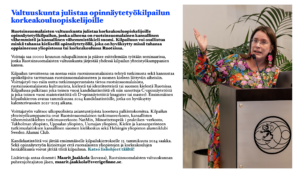Last week, my intensive week in Stockholm culminated with the opportunity to announce a new thesis competition for students in higher education. The Sweden-Finnish Delegation introduced a thesis competition, with an amount of 10 000 Swedish crowns (about 870 euro) on topics that deal with Sweden-Finnishness and the national minority language Finnish in Sweden.
The competition is open to university students who have written a Bachelor’s or Master’s thesis on the topic at a Swedish university, in any language. Bachelor’s theses are granted every other year and Master’s theses (both in the Master’s and Magister’s study programmes, the first being a two-year and the latter a one-year programme) every other year. The reason for alternating this way is simply to collect a sufficient number of theses submitted to each competition, and not to mix categories, as the criteria for Bachelor’s and Master’s are highly different. According to my mapping about the latest decade, there are at least four theses directly addressing the national minority Sweden-Finns or the national minority language Finnish accepted at Swedish universities every year. Within the period of two years, there should thus be more than eight theses eligible to run the competition.

The news on the Sweden-Finnish Delegation’s website.
The initiative for the competition came from the field, and I’m glad the Delegation immediately tuned in to it. I contacted relevant collaborators and based on their constructive input I compiled the rules for the competition. The partners of collaborators for the competition include Stockholm University, Umeå University, Uppsala University and the National Language Centre for Finnish at the Swedish Institute of Language and Folklore Isof, as well as four research networks.
The first deadline is for Bachelor’s theses and it will be on 15 January 2024. The winner will be selected by a jury consisting of external experts. We already have some further ideas connected to the thesis competition, but let’s not count chickens before they are hatched. For now, I hope that the thesis competition will make it more attractive for students to address the national minority issues and, this way, help us produce evidence-based knowledge about the national minority. However, the competition is not just a catalyst for producing knowledge – it is also about producing future experts.

Be the first to comment on "Thesis competition on the Finnish language and culture in Sweden"